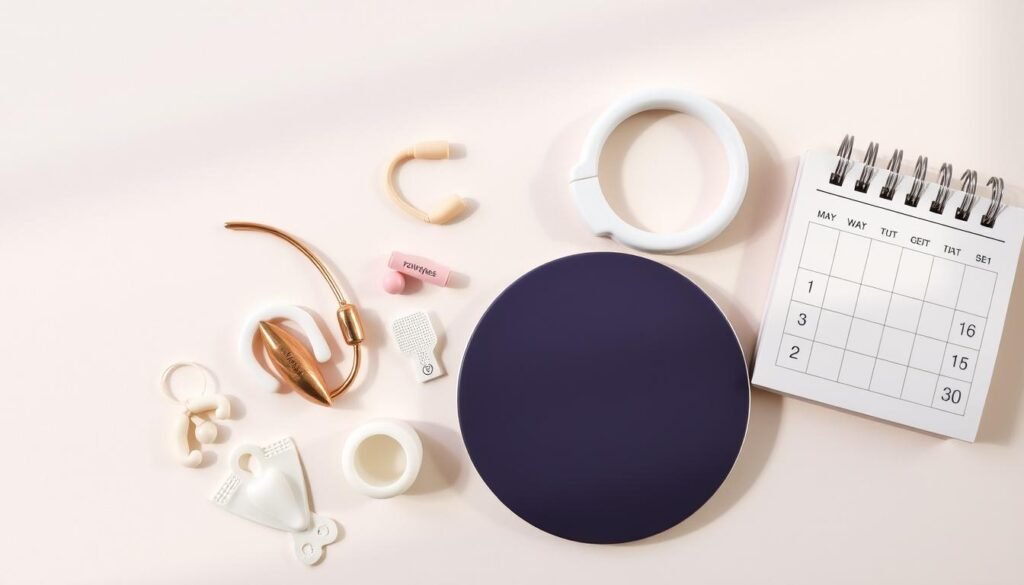A 2016 study in Denmark showed a link between hormonal birth control and depression. This study had over one million women participants. It revealed that women using these contraceptives were more likely to get diagnosed with depression. This information suggests a complicated tie between hormonal birth control and mental health in women of child-bearing age.
Many factors, such as hormonal changes and personal mood disorder history, can make young women more prone to depression.
In the U.S., many people deal with major clinical depression. It’s important to understand how hormonal contraceptives might affect mental health. Some research indicates that certain birth control types may help with mood swings. Other types, however, could make mood disorders worse. This article discusses how reproductive health is linked to mood disorders. It will help those looking for the best birth control considering depression risks.
Key Takeaways
- Hormonal birth control may increase the risk of depression, especially in adolescents.
- Individual reactions to hormonal contraceptives can vary widely, affecting mood differently.
- Newer contraceptive options may carry fewer mood-related side effects than traditional methods.
- Non-hormonal birth control alternatives are available for those concerned about mental health impacts.
- Consulting healthcare providers about medical history and mood concerns is essential before starting hormonal contraception.
Understanding the Connection Between Birth Control and Depression
The link between birth control and depression is getting lots of focus lately. Many studies have looked at how birth control affects mood disorders in women of childbearing age. They’ve found a worrying pattern: certain birth control methods increase the chance of depression, mainly among teenagers.
A big study from Denmark, with over a million women, showed a clear link between hormonal birth control and more depression cases. This connection needs serious thought because different types of birth control can have different effects on emotions. For example, synthetic estrogens might help with depression, but synthetic progestogens could make mood disorders worse.
Some common birth control methods, like the ‘mini-pill’ and Depo-Provera shots, have been tied to more depression symptoms in some people. However, a newer option, Zoely, seems better for women with past mood issues. It appears that birth control with ethinyl estradiol can raise depression risk, especially in the first two years of taking it.
Doctors stress the importance of talking about mental health before starting on birth control. Women facing a lot of stress or mood swings might be more affected by birth control’s mental health side effects. Knowing the possible risks and benefits helps make informed choices about reproductive health. It’s crucial to understand the deep link between birth control and mental health for overall well-being.
| Type of Contraceptive | Impact on Depression |
|---|---|
| Traditional Pills (Ethinyl Estradiol) | Potential positive effects on mood |
| Mini-Pill (Progestogen-only) | Higher risk of depressive disorders |
| Injectable (Depo-Provera) | Increased symptoms of depression |
| Zoely (Progestogen and Estradiol) | Positive response in mood disorders |
The Importance of Mental Health in Reproductive Health
Mental health impacts women’s overall well-being and their reproductive health. Women in the U.S. are more at risk of depression compared to men. Statistics show that 12% of women may undergo major depression during their lifetimes, and 8.4% face depressive disorders yearly. Socioeconomic factors play a big role, affecting poorer, unemployed, and less-educated women the most.
The link between mental and reproductive health is clear when looking at depression and birth control use. Women with mental health issues have more unintended pregnancies. This situation can result in higher abortion rates. Yet, less than half of the women with depression get the right help, showing a gap in support and awareness.

Depression and anxiety also lead to less use of contraceptives, or stopping their use. These women might believe negative things about birth control, making it hard to choose wisely. Healthcare providers talking about mental health could help women understand and stick to their birth control plans. This could improve mental health too.
So, it’s key to include mental health in reproductive health talks. Knowing a patient’s mental state helps doctors suggest the best birth control for them. This supports both their mental and reproductive health. Making lifestyle changes is another way to help women’s mental health. For tips on managing depression through lifestyle, check out self-care habits that boost mental well-being.
Hormonal Contraceptives and Depression
It’s important to know how birth control can impact your mood. There are many types of hormonal contraceptives, like the pill. Each one can affect your feelings in different ways. The link between these contraceptives and depression is still debated by experts.
Impact of Estrogen and Progesterone on Mood
Estrogen and progesterone play big roles in how we feel. Estrogen is known for its neuroprotective properties, helping fight off depressive symptoms. It does this by working on brain chemicals like serotonin. On the other hand, progesterone could make you feel more depressed. While contraceptives themselves don’t cause depression, their impact varies from person to person.
The Role of Progestin-Only Pills and Depressive Symptoms
Progestin-only pills deserve special attention when looking at depression. Studies suggest they could raise the risk of needing antidepressants, especially in young women. These women seem more affected by the hormonal changes these pills cause. Doctors sometimes struggle to give advice on birth control due to a lack of training.
Screening for depression before prescribing birth control is key. This is especially true for women with a history of mood issues. The American College of Obstetrician and Gynecologists recommends checking mental health first. This ensures the safety and well-being of the patient.
| Type of Contraceptive | Relative Risk of Initiating Antidepressants | Relative Risk of Suicide Attempts |
|---|---|---|
| Combined Oral Contraceptives | 1.23 | 1.91 |
| Progestin-Only Pills | 1.34 | 2.29 |
| Transdermal Patch | 2.0 | 3.28 |
| Vaginal Ring | 1.6 | 2.58 |
| Levonorgestrel IUD | 1.4 | N/A |
A big study with over one million women linked some contraceptives to more depression treatment. There’s a need for better understanding and training on this. To learn more, check out hormonal contraceptives and depression.

Best Birth Control for Depression Sufferers
Choosing the right birth control is key for people with depression. It helps manage not just reproductive health, but mental wellness too. Combination pills, which have estrogen and progestin, show promise. These pills are helpful for women facing mood-related issues.
Combination Pills That Alleviate Symptoms
Yaz is one example of a combination pill. It’s known to help with Premenstrual Dysphoric Disorder (PMDD). For women dealing with PMDD, these hormonal options can make a big difference. Studies show about 10-15% of women face depression, and PMDD affects 5-8% of them. Using hormonal birth control offers relief from PMS and PMDD.
Benefits of Continuous Use of Hormonal Contraceptives
Using hormonal birth control non-stop is great for mood disorders. Pills like Yaz have up to 84 active pills. This means fewer periods and less emotional upset. Women 25-34 years old who use them often feel better mentally. They face fewer depressive symptoms than those who don’t use hormones.
Yaz can help with PMDD and might lower the risk of certain cancers. It can also improve bone density. Choosing the best birth control is crucial for depression sufferers. It ensures good mental and physical health.
| Birth Control Type | Key Benefits | Hormones Present |
|---|---|---|
| Combination Pills | Alleviates PMS/PMDD, reduces cancer risks | Estrogen and Progestin |
| Minipill | Consistent use crucial; lower cancer risk | Progestin only |
| Extended Cycle Pills | Fewer menstrual cycles, less emotional disturbance | Estrogen and Progestin |
Non-Hormonal Birth Control Options
Many people look for birth control options that don’t involve hormones. Options like copper IUDs and barrier methods prevent pregnancy effectively. They don’t have the hormonal side effects. Knowing about these can help you choose the best option for your health.
Understanding Copper IUDs and Their Mental Health Effects
Copper IUDs, like Paragard, are a preferred choice for non-hormonal birth control. They work well for up to ten years. This means you don’t have to deal with the ups and downs of hormones. However, mental health considerations are important to think about. Some women feel better without the hormone changes. But, others might have different emotional reactions.
Exploring Barrier Methods like Condoms and Mental Well-Being
Barrier methods come in different forms, like condoms, diaphragms, and cervical caps. Condoms are very common. They stop pregnancies and protect against diseases. Using condoms can make you feel good about your choices. It can boost your confidence in handling your sexual health. By exploring these options, you can find what suits you best. And you don’t have to worry about it hurting your mental health.

Birth Control Side Effects on Mental Health
Many women need to know how birth control affects mental health. Hormonal contraceptives are effective but can change mood. These changes impact everyday life, causing anxiety, mood swings, and depressive symptoms.
Common Mood Changes Associated with Contraceptives
About 10-15% of women experience depression with contraceptives. The type of contraceptive affects the mood. Hormonal contraceptives particularly affect emotional well-being. One study found these impacted 130 women’s moods due to increased TNF-alpha, a stress response marker.
Women not on hormonal birth control reacted differently under stress, showing higher interleukin-6 levels. Yet, women aged 25-34 on hormonal contraceptives had fewer depression symptoms. This shows hormonal birth control can both harm and help mood, depending on the person.
Monitoring Symptoms During Birth Control Transition
It’s key to watch for mood changes when switching birth control. This helps make sure the method fits the woman’s mental and reproductive needs. Health professionals can then give better advice based on observed changes.
| Contraceptive Type | Effect on Mood | Notes |
|---|---|---|
| Hormonal Pills | Varies; possible increase in anxiety | Higher TNF-alpha levels may indicate stress response |
| Non-Hormonal Pills | Typically stable | May help reduce depressive symptoms |
| Copper IUDs | Minimal impact reported | Presents a non-hormonal alternative |
| Barrier Methods | Generally neutral | No hormonal side effects |
Understanding birth control’s impact on mental health can improve reproductive decisions. This leads to better well-being for women choosing contraceptives.
Managing Depression with Contraceptives
Successfully managing depression with contraceptives takes careful thought about both reproductive health and mental well-being. People have their own challenges when picking birth control, especially if they have mood disorders. It’s important to choose birth control methods that work well with mental health backgrounds and to stay active in consulting professionals for custom advice.
Strategies For Balancing Reproductive Health and Mood Disorders
Choosing the right birth control can greatly impact how you feel, especially with mood disorders. There are ways to help keep mental health positive while on birth control:
- Pick contraceptives that are known to lessen the chance of making depression worse. For example, combo pills might ease PMS and PMDD symptoms.
- Have regular check-ups to see how birth control affects mood. This helps decide if you should keep using it or try something else.
- Always talk openly with healthcare providers. This way, any problems can be quickly dealt with.
- Work with mental health experts who know a lot about reproductive health and mood disorders to create a good plan.
Consulting Professionals for Personalized Advice
It’s vital to follow expert advice when choosing the best contraceptive option. Consulting professionals improves understanding of how birth control and mental health conditions might interact. Getting advice based on your health history can lead to better outcomes. Here are tips for talking with healthcare providers:
- Bring a list of all current meds and your mood disorder history.
- Talk about any issues with past contraceptives for better advice.
- Ask how the chosen birth control might affect mood and mental health.
- Find out the best ways to watch for and handle any bad reactions when switching contraceptives.
By focusing on managing depression and contraceptives, people can find a good balance for better reproductive health and emotional well-being. With more than 40 birth control choices available, working with healthcare providers to pick the best one is key for physical and mental health.
Contraceptive Counseling for Depressed Patients
It’s vital for people with depression to get good contraceptive advice. This helps them understand their reproductive and mental health needs better. Tailored family planning services can greatly improve their life quality. By offering a place where they can talk openly about their mental health, healthcare professionals can find the right birth control. They pick what suits each patient’s unique situation.
The Importance of Comprehensive Family Planning Services
When it comes to mental health, knowing how different birth control methods affect each person is key. Many women react differently to hormonal contraceptives. In fact, some studies suggest hormonal birth control could lessen depression symptoms for some. Since depression affects 10-15% of women, giving depressed patients personalized contraceptive counseling is smart. It helps healthcare providers give better care, improving mental health results.
Assessing Individual Reactions to Different Birth Control Methods
Looking into how different contraceptives affect people is crucial. It helps lessen depressive symptoms and boosts emotional health. It’s important for women, especially those with PMDD, to talk about their options. Healthcare providers can help them find the right hormonal or non-hormonal options. This personalized approach in family planning helps people manage both their reproductive and mental health better. To learn how contraceptives can affect mental health, visit this resource.